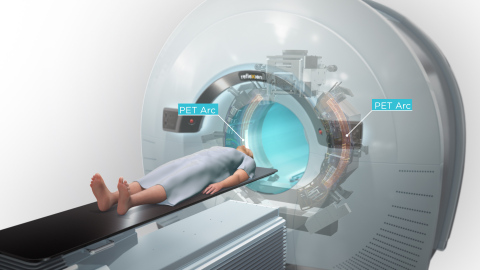RefleXion Medical , a therapeutic oncology company pioneering biology-guided radiotherapy* ( BgRT ) for treating all stages of cancer, today announced a clinical collaboration with Merck (known as MSD outside the U.S. and Canada) to evaluate the safety and efficacy of KEYTRUDA® (pembrolizumab), Merck’s anti-PD-1 therapy, in combination with BgRT in multiple late-stage cancers, including non-small cell lung cancer (NSCLC)
HAYWARD, Calif.--(BUSINESS WIRE)-- Reflexion Medical, a therapeutic oncology company pioneering biology-guided radiotherapy* (BgRT) for treating all stages of cancer, today announced a clinical collaboration with Merck & Company (known as MSD outside the U.S. and Canada) to evaluate the safety and efficacy of KEYTRUDA® (pembrolizumab), Merck’s anti-PD-1 therapy, in combination with BgRT in multiple late-stage cancers, including non-small cell lung cancer (NSCLC), in two randomized controlled clinical trials.
This press release features multimedia. View the full release here: https://www.businesswire.com/news/home/20200528005450/en/

The innovative design of the RefleXion™ X1 machine rotates up to 60 times faster than other linear accelerators and modulates the radiation dose from 100 points per beam station for precise dose delivery. This image depicts two 90-degree PET arcs that sense tumor emissions to guide radiotherapy delivery. (Graphic: Business Wire)
“It is exciting to see these companies from different fields collaborating to investigate immuno-radiotherapy approaches for patients with metastatic cancer,” said Jason Luke, MD, director of the Cancer Immunotherapeutics Center at UPMC Hillman Cancer Center and associate professor of medicine at the University of Pittsburgh School of Medicine. “Several published clinical and translational studies laid the foundation for combining immunotherapy and radiotherapy, but despite their promise, available conventional radiotherapy techniques are limited in their general ability to reach more than 1-2 tumors.
“We hypothesize that BgRT may improve treatment efficacy and expand the immunologic impact of therapy by overcoming this limitation and treating more tumors,” continued Dr. Luke. “This expanded treatment potential allows the field to pose new questions such as: What outcomes can combination therapy achieve when BgRT treats 5, 10 or even more sites of disease?”
This clinical collaboration reflects interest by researchers, clinicians and industry in exploring external beam radiotherapy to potentially expand the application of immunotherapy and improve outcomes for patients with advanced-stage cancer. Worldwide, over 1,000 clinical trials registered with the National Institutes of Health seek to determine the effect of combining immunotherapy and radiotherapy. Currently, very few of these trials reflect collaboration between radiotherapy and pharmaceutical companies.1
The aim of the clinical collaboration between RefleXion and Merck is to establish whether treating multiple tumors with BgRT, a novel external beam radiotherapy treatment modality in development, is safe and amplifies KEYTRUDA’s therapeutic effect. The RefleXion™ X1 machine with BgRT is designed to overcome the technical limitations that restrict radiotherapy delivery to one or two sites of disease, and instead allow it to reach multiple sites during the same treatment session, even those sites that move due to breathing or digestion.
“We believe BgRT will one day treat all visible tumor sites, which could lead to better patient outcomes, particularly when used with immunotherapy,” said Todd Powell, CEO and president of RefleXion. “The collaboration with Merck will allow us to explore this combined effect in randomized controlled clinical trials that, if successful, may lead to significant changes in the way physicians approach cancer care for patients with late-stage disease.”
RefleXion recently announced the close of a $100M equity financing round, the sale of their first commercial system and FDA clearance for the X1 machine for conventional radiotherapy applications. The X1 is the only platform that includes high quality computed tomography (CT) imaging to reduce motion artifacts during patient setup and x-ray treatment delivery, resulting in accurate targeting of the radiation dose to a patient’s tumor.
About Combining Immunotherapy and External Beam Radiotherapy
External Beam Radiotherapy (EBRT) by itself treats a discrete target to provide local tumor control; however, clinical evidence suggests that EBRT potentially converts the locally radiated tumor into an in situ vaccine that contributes to systemic control of the cancer.2 The exploration of EBRT with immunotherapy began in earnest after a rapid succession of advances led to a corresponding acceleration of clinical trials and FDA approvals of different drugs for various cancer indications. Ongoing clinical trials for this combined approach are aimed at confirming safety and demonstrating clinical efficacy, determining the appropriate dosing and sequencing of each treatment, and developing biomarkers to identify the patients most likely to benefit.3
About RefleXion Medical
RefleXion is a privately-held therapeutic oncology company developing the first biology-guided radiotherapy (BgRT) machine, a significant change in strategy from single tumor therapy to the ability to one day treat multiple tumors in the same treatment session in cancers that have metastasized. Currently, the RefleXion machine is cleared for the delivery of stereotactic body radiotherapy (SBRT), stereotactic radiosurgery (SRS) and intensity modulated radiotherapy (IMRT), all different techniques of EBRT. The company is also developing BgRT, which incorporates positron-emission tomography (PET) data to enable tumors to continuously signal their location. The BgRT technology will synchronize these data with the linear accelerator to direct radiotherapy to tumors with subsecond latency.
RefleXion is backed by premier investment firms, TPG Growth/The Rise Fund, KCK Group, Sofinnova Partners, PSP, Venrock, T. Rowe Price and global pharmaceutical leaders Pfizer Ventures and Johnson & Johnson Innovation, JJDC Inc. UPMC holds a passive, minority investment in RefleXion, and Dr. Jason Luke is a paid consultant for RefleXion.
*The RefleXion X1 BgRT capability requires 510(k) clearance; this feature is not available for sale.
KEYTRUDA® is a registered trademark of Merck Sharp & Dohme Corp., a subsidiary of Merck & Co., Inc., Kenilworth, NJ, USA
1https://clinicaltrials.gov/ct2/results?term=radiotherapy+and+immunological+agent&cond=cancer&Search=Apply&recrs=b&recrs=a&recrs=f&recrs=d&age_v=&gndr=&type=&rslt= 2https://jitc.biomedcentral.com/articles/10.1186/s40425-016-0156-7#Tab2
3Ibid
View source version on businesswire.com: https://www.businesswire.com/news/home/20200528005450/en/
Source: RefleXion Medical
Smart Multimedia Gallery
The innovative design of the RefleXion™ X1 machine rotates up to 60 times faster than other linear accelerators and modulates the radiation dose from 100 points per beam station for precise dose delivery. This image depicts two 90-degree PET arcs that sense tumor emissions to guide radiotherapy delivery. (Graphic: Business Wire)







